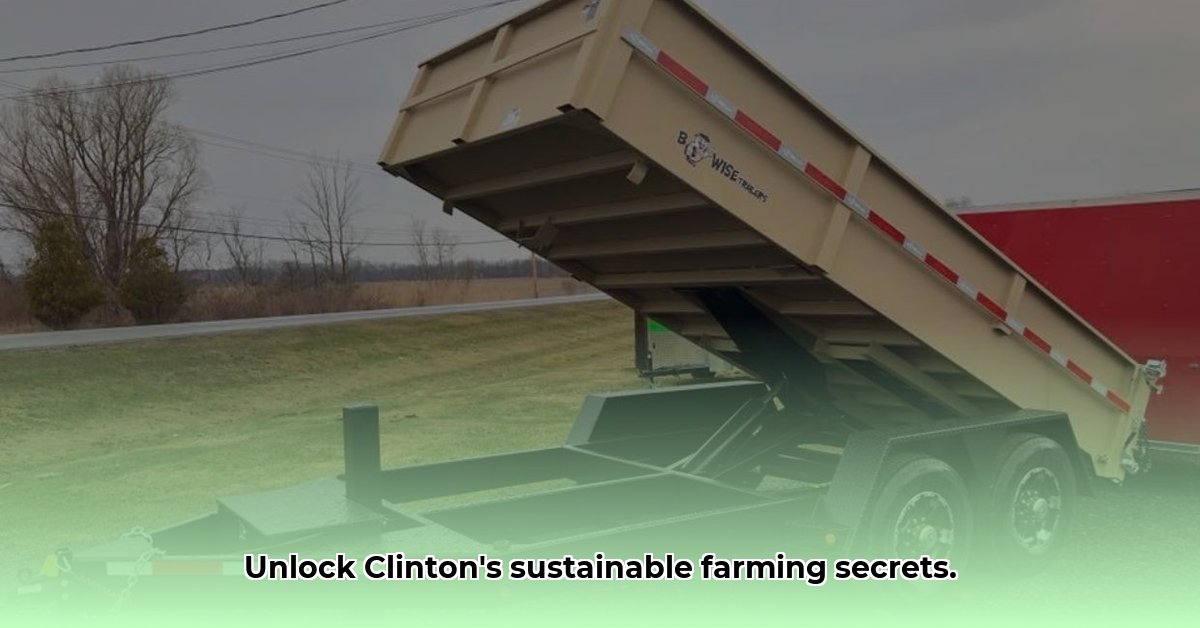
Sustainable agriculture is no longer a niche concept; it's the future of food production. Farmers are increasingly seeking equipment that maximizes efficiency while minimizing environmental impact. Clinton Truck & Tractor in Clinton, North Carolina, plays a pivotal role in this transition, offering access to cutting-edge sustainable agricultural machinery and expert advice. This article explores the market landscape, highlighting key players, technological advancements, cost considerations, and actionable steps for farmers looking to adopt sustainable practices. For more information on tractor sizes, check out this helpful tractor size chart.
Choosing the Right Tools for a Sustainable Farm: A Market Overview
The market for sustainable agricultural equipment is dynamic and diverse. Major players like Case IH, known for their robust tractors and advanced technology, compete alongside brands such as Kubota, McCormick, and Great Plains, each with unique strengths. However, Clinton Truck & Tractor provides a crucial local element, offering personalized advice and support tailored to the specific needs and challenges of North Carolina farmers. But how do you choose the right equipment for your farm?
Key Players and Their Strengths in Sustainable Agriculture
Case IH offers a comprehensive range of high-horsepower tractors and implements, often incorporating advanced precision farming technologies. Kubota's focus on smaller, fuel-efficient tractors makes them ideal for smaller farms or specialized operations. McCormick provides a strong balance of performance and affordability, while Great Plains excels in tillage and seeding equipment. Clinton Truck & Tractor offers local expertise and access to a variety of these brands. Choosing the best for your farm hinges on your needs. Do you need technology for precision planting, or are you focused on fuel efficiency in your existing operation?
Technological Advancements: Precision Farming and Beyond
Modern agriculture relies heavily on technology to enhance sustainability. Precision farming technologies, including GPS guidance, variable rate application (VRA), and auto-steer, optimize resource use by reducing overlap and waste. Fuel-efficient engines, such as those employing selective catalytic reduction (SCR) technology (a system that reduces nitrogen oxide emissions), are becoming the norm, lowering operating costs and reducing environmental impact. These advances aren’t just about reducing your expenses; they're about making smarter use of your resources. But how efficient are these technological leaps when costs are considered?
The Economics of Sustainable Farming: Cost Considerations and ROI
Implementing sustainable farming practices often involves a significant upfront investment. New equipment, incorporating the latest technologies, commands a higher price. However, the long-term return on investment (ROI) can be substantial. Reduced fuel consumption, minimized fertilizer and pesticide waste, and increased yields contribute to significant cost savings over the lifespan of the equipment. Used equipment represents a more affordable entry point but may require more frequent maintenance and lack the latest technological enhancements.
Financing and Affordability: Making Sustainable Farming a Reality
Financing plays a critical role in making sustainable technologies accessible. Traditional loans, leasing programs, and government subsidies can help farmers manage the initial costs. Clinton Truck & Tractor can assist you in navigating these options, finding a financing solution that aligns with your budget and financial objectives. Given the potential long-term cost savings, it’s worth understanding how this initial investment makes a difference.
Actionable Steps: A Practical Guide to Sustainable Farming
Ready to transform your farming practices? Follow these steps:
- Assess your farm's needs: Identify areas where sustainable technologies can yield the greatest impact. This is about understanding specific challenges and what your farm needs most.
- Research equipment options: Explore the offerings from Case IH, Kubota, McCormick, Great Plains, and other manufacturers. Clinton Truck & Tractor provides invaluable local expertise during this step.
- Compare equipment specifications: Directly comparing fuel efficiency, operational costs, and technological capabilities between different brands is essential.
- Calculate ROI: Project long-term savings based on reduced input costs and increased yields. This is key to justifying your investment.
- Explore financing options: Determine suitable financing solutions, including loans, leases, and government subsidies.
- Develop a comprehensive plan: Integrate sustainable practices and new equipment into your overall farming strategy. This step often involves a reassessment of your farm's current layout and processes.
- Leverage government incentives: Seek out federal, state, and local subsidies designed to support sustainable agriculture.
Conclusion: Partnering for a Sustainable Future
Sustainable farming is not just an environmental imperative; it's a sound business strategy. By adopting fuel-efficient equipment and precision farming technologies, farmers can reduce costs, increase yields, and minimize their environmental footprint. Clinton Truck & Tractor, with its local expertise and commitment to sustainable solutions, is a valuable partner in this journey. They can help you unlock the secrets to efficient, sustainable farming for increased profitability and environmental stewardship.